
By Giulia Carbonaro & Reuters • Updated: 22/09/2022 – 16:16
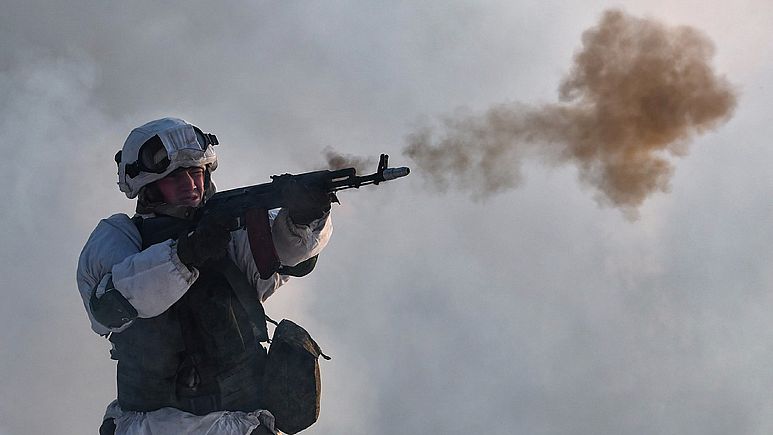
a Russian soldier attends a military exercising at the Golovenki training ground in the Moscow region, Russia – Copyright Credit: AP
SHARE THIS ARTICLE




Russian President Vladimir Putin declared a “partial military mobilisation“, which could see an initial 300,000 reservists join Moscow’s war in Ukraine.
But, how will the call-up of fresh troops work? What has been the reaction in Russia? And what happens next if the mobilisation fails?
What do we know about the troops call-up?
Putin referred to a partial mobilisation of reservists in his speech, but there is little detail on numbers in the government’s decree.
Russia’s defence minister Sergei Shoigu did later say that up to 300,000 people could be mobilised from a pool of 25 million.
Critics point out the decree has been left deliberately vague to give the authorities a wide degree of latitude when implementing it.
The immediate call-up of 300,000 reservists will concern those who have previously served in the Russian army and have combat experience or specialised military skills. Students or conscripts — young men serving mandatory 12-month terms in the armed forces — will not be included.
The reservists cannot physically be deployed to Ukraine immediately as they will need to first undergo refresher or new training and be made familiar with the way Russia executes what it calls its “special military operation”.

SPONSORED CONTENTWeb3 M&A Is Coming of Age With the Help of the Industry’s BestMergers and acquisitions (M&A) doesn’t always get the love it deserves, but it should. Across the economy, M&A delivers huge value to everyone when it’s done right. For strategically smart…By Acquire.Fi
Western military analysts forecast it will therefore be several months before they see action.
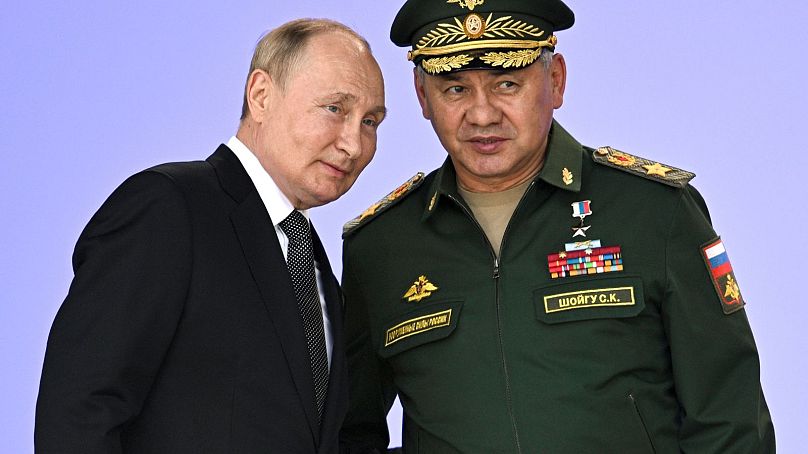
Reservists will be financially incentivised and be paid like full-time serving professional soldiers who make much more money than the average Russian wage. That may make the proposition more attractive for some men in the provinces where wages are traditionally lower than in big cities.
Professional soldiers known as ‘kontraktniki’ who are currently serving in the armed forces will have their contracts automatically extended until the authorities decide to end the period of temporary mobilisation. In other words, it just became much harder for serving professional soldiers to quit.
A day earlier, the Russian parliament approved a bill to toughen punishments for crimes such as desertion, damage to military property and insubordination if they are committed during military mobilisation or combat situations. According to a copy of the legislation, seen by Reuters, voluntary surrender would become a crime for Russian military personnel punishable by 10 years in prison.
What does Putin’s move tell us about the conflict in Ukraine?
Putin’s announcement came only a day after it was announced that “referendums” on joining Russia will begin on Friday in the Russian-occupied areas of Luhansk, Donetsk, Kherson, and Zaporizhzhya.
“The idea here is that if these territories join the Russian Federation, any attacks upon them would then be considered as attacks on Russia,” Dr Marina Miron, from the Defence Studies Department of the King’s College London, told Euronews.
“So, it is logical to start this partial mobilisation now, especially in light of what happened in Kharkiv Oblast and which served as a catalyst for this rapid turn in events,” Dr Miron added, referring to Kyiv’s counteroffensive in the north-east of the country, where it has reclaimed 8,000 square kilometres of territory.
“It is suggested that the number was carefully calculated and only the amount needed to protect those territories is being mobilised,” said Dr Miron.
The partial mobilisation is also aimed at putting the campaign in Ukraine at the centre of the Russian public’s attention and making people care about the Russian cause, she claimed.
“The Kremlin has been trying to cultivate the national spirit for many years now and following this logic, this mobilisation is perceived as a way to recruit more people to defend the homeland,” Dr Miron said.
“It is not about the war in Ukraine; it is about defending Russia and territories belonging to Russia, however far-fetched that might seem.
“The war in Ukraine is not a war between Russia and Ukraine, but a war between Russia and ‘the collective West’, in the Kremlin’s eyes.
“So, this narrative is used to justify such mobilisation in the first place.”https://platform.twitter.com/embed/Tweet.html?dnt=false&embedId=twitter-widget-0&features=eyJ0ZndfdGltZWxpbmVfbGlzdCI6eyJidWNrZXQiOlsibGlua3RyLmVlIiwidHIuZWUiLCJ0ZXJyYS5jb20uYnIiLCJ3d3cubGlua3RyLmVlIiwid3d3LnRyLmVlIiwid3d3LnRlcnJhLmNvbS5iciJdLCJ2ZXJzaW9uIjpudWxsfSwidGZ3X2hvcml6b25fdGltZWxpbmVfMTIwMzQiOnsiYnVja2V0IjoidHJlYXRtZW50IiwidmVyc2lvbiI6bnVsbH0sInRmd190d2VldF9lZGl0X2JhY2tlbmQiOnsiYnVja2V0Ijoib24iLCJ2ZXJzaW9uIjpudWxsfSwidGZ3X3JlZnNyY19zZXNzaW9uIjp7ImJ1Y2tldCI6Im9uIiwidmVyc2lvbiI6bnVsbH0sInRmd19jaGluX3BpbGxzXzE0NzQxIjp7ImJ1Y2tldCI6ImNvbG9yX2ljb25zIiwidmVyc2lvbiI6bnVsbH0sInRmd190d2VldF9yZXN1bHRfbWlncmF0aW9uXzEzOTc5Ijp7ImJ1Y2tldCI6InR3ZWV0X3Jlc3VsdCIsInZlcnNpb24iOm51bGx9LCJ0Zndfc2Vuc2l0aXZlX21lZGlhX2ludGVyc3RpdGlhbF8xMzk2MyI6eyJidWNrZXQiOiJpbnRlcnN0aXRpYWwiLCJ2ZXJzaW9uIjpudWxsfSwidGZ3X2V4cGVyaW1lbnRzX2Nvb2tpZV9leHBpcmF0aW9uIjp7ImJ1Y2tldCI6MTIwOTYwMCwidmVyc2lvbiI6bnVsbH0sInRmd19kdXBsaWNhdGVfc2NyaWJlc190b19zZXR0aW5ncyI6eyJidWNrZXQiOiJvbiIsInZlcnNpb24iOm51bGx9LCJ0ZndfdHdlZXRfZWRpdF9mcm9udGVuZCI6eyJidWNrZXQiOiJvZmYiLCJ2ZXJzaW9uIjpudWxsfX0%3D&frame=false&hideCard=false&hideThread=false&id=1572568398969868288&lang=en&origin=https%3A%2F%2Fwww.euronews.com%2F2022%2F09%2F22%2Fputins-reservists-call-up-how-will-it-work-and-what-does-it-mean-for-russias-war-in-ukrain&sessionId=d97466de5458dbf6fb12940a770bd38b3deeb077&siteScreenName=euronews&theme=light&widgetsVersion=1bfeb5c3714e8%3A1661975971032&width=550px
Nikolay Petrov, a senior research fellow within the Russia and Eurasia programme at London’s Chatham House, agrees.
“Putin’s speech was an attempt to turn the imperialist war into a patriotic war” after nearly seven months of fighting, he said.
He thinks the upcoming “referendums” have the same objective, to compensate for a faltering campaign in Ukraine.
“The unexpected hasty referendums in the occupied territories of Ukraine are an attempt by the Kremlin to capture these territories politically, since it was unable to do so militarily,” Petrov said.
On the other hand, Petrov also believes the partial mobilisation might have been called to appease the concerns of political allies.
“Putin’s recent meetings with the leaders of China, India and other non-Western countries, who have publicly voiced their dissatisfaction with the protracted war and called for its ending, may have also played a role,” Petrov said.
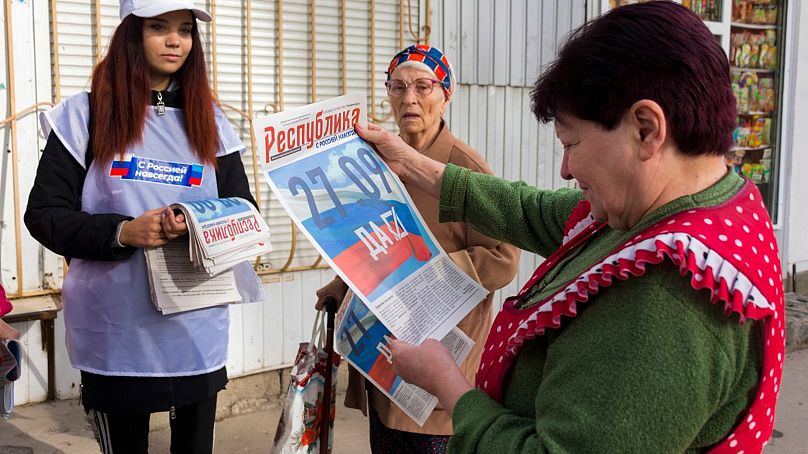
How prepared are Russia’s reservists?
In a televised speech to the nation on Wednesday, Putin said the “partial mobilisation” involves “only citizens who are currently in the reserve will be subject to conscription, and above all, those who served in the armed forces have a certain military speciality and relevant experience”.
According to Shoigu, only those with relevant combat and service experience will be mobilised. The reservists answering to this description are about 25 million people, but only around 1% will be mobilised, claimed Shoigu.
“The question is: do all these criteria have to be fulfilled or is it enough to fulfil just one?” Dr Miron asked. “Again, despite the seemingly clear criteria, this has caused a lot of concern amongst potential candidates. It should be noted that Russia has its own ‘Vietnam syndrome’ after the Soviet venture in Afghanistan, so whatever is to happen, the Kremlin will have to skillfully design its informational campaign to avoid potential backlash on a larger scale.”
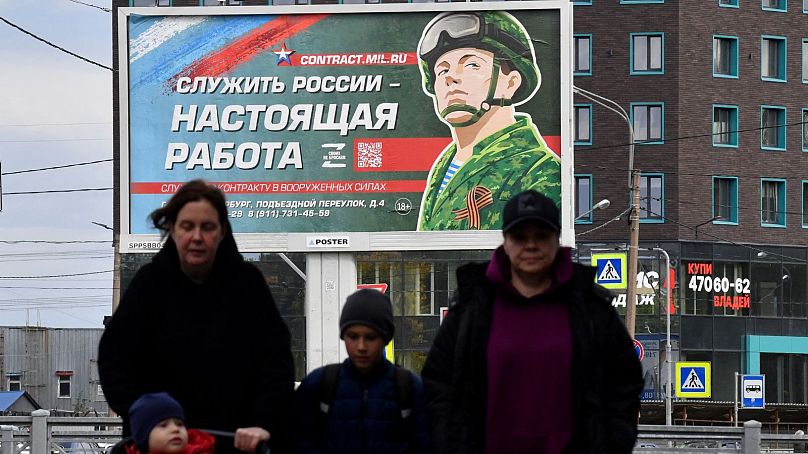
There may also be issues with the preparedness of reservists.
According to the Washington-based think tank the Institute for the Study of War (ISW), “the Russian reserve has over two million former conscripts and contract servicemen on paper, but few are actively trained or prepared for war”.
ISW writes that, historically, “only 10 per cent of reservists receive refresher training after completing their initial term of service”, adding that Russia lacks the administrative and financial capacity to train reservists on an ongoing basis.
What has been the reaction in Russia?
The announcement has triggered protests in Russia, where some are increasingly fatigued by what in the country is still known as the “special military operation” in Ukraine.
Russian media reported a spike in demand for plane tickets shortly after Putin’s televised speech on Wednesday.
On the same day, jailed dissident and opposition leader Alexei Navalny accused Putin of sending more Russians to their deaths.
“It is clear that the criminal war is getting worse, deepening, and Putin is trying to involve as many people as possible in this,” Navalny said in a video message from jail recorded and published by his lawyers. “He wants to smear hundreds of thousands of people in this blood,” Navalny said.
On Wednesday, the Youth Democratic opposition movement “Vesna” called for nationwide protests.
“Thousands of Russian men — our fathers, brothers and husbands — will be thrown into the meat grinder of the war. What will they be dying for? What will mothers and children be crying for?” the group said.
Avtozak, a Russian group that monitors protests, reported demonstrations by dozens of people in cities, including Ulan-Ude and Tomsk in Siberia, and Khabarovsk in the Far East, with some protesters being arrested by authorities.
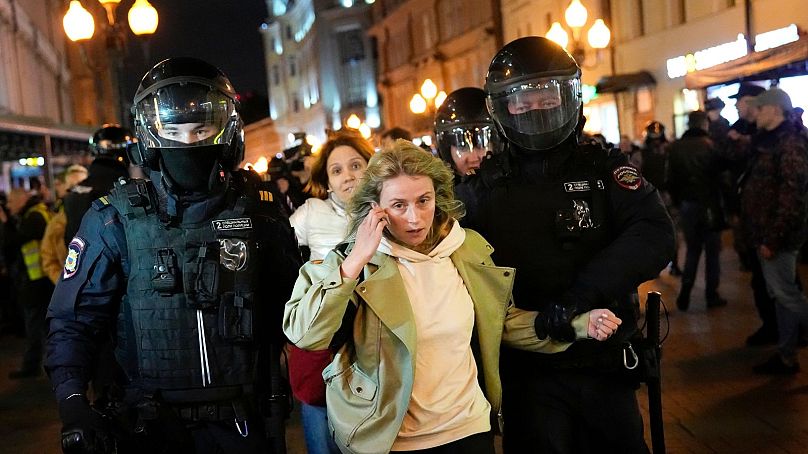
“The feelings towards this decision have been mixed and there have been quite a few instances of opposition from several media outlets, such as the St. Petersburg-based news site Bumaga, which claimed in its Telegram channel that the frequency of the search term ‘how to break your arm’ had spiked amongst Google users from Russia,” Dr Miron said.
“Given the protests that took place across Russia, it is to assume that the population is not in favour of this new measure. However, the official media is trying to downplay this new decision, hence, there will be an attempt to pacify the population segment that is against this partial mobilisation,” she added. “There will be a need to act on the information front to prevent a complete polarisation of the Russian population. The situation is quite complicated as supporting Russia’s ‘special military operation’ in Ukraine is one thing, but it is quite another thing when there is a possibility of being drafted to actively contribute.”
It’s unclear if the size of the protests will grow in the coming days, especially considering that the Kremlin still harshly punishes those who criticise the military and Russia’s war in Ukraine.
“The Kremlin has sharply tightened legislation in the spirit of Stalin’s time, which will mean severe penalties for anyone evading mobilisation, refusing to participate in the war and desertion,” Petrov said.
“The repressive nature of the regime inevitably increases. Altogether, radically changing the game and raising the stakes looks like a manifestation of Putin’s weakness rather than strength.”
Dr Miron also said that there will be increased pressure on reservists to respond to the call to arms.
“There will be a lot of pressure exercised upon those who refuse to mobilise or cannot accredit their inability to serve for whatever reason,” she said.
“It is to assume that those who are not ‘patriotic’ enough will try to make their case rather than avoiding response or flat-out refusing service. In many cases, people will have to choose the smaller evil, whatever it might be in their particular situation. Given the current economic situation, there is a chance that those from poorer regions of the Russian Federation will take up this opportunity to earn some money,” she said.
If this doesn’t work, what next?
Orysia Lutsevych, head and research fellow at the Chatham House’s Ukraine Forum, believes the partial mobilisation won’t be enough to turn the tide of the war and give Russian troops the upper hand.
“Partial mobilisation will not have a decisive impact on the battlefield because new recruits are untrained and not combat-ready,” she said, adding that she doesn’t see any of the initiatives pushed by the Kremlin as likely to succeed.
“Russian internal military infrastructure can hardly support general mobilisation as it was downgraded by recent ‘reforms’. The illegal ‘referendums’ will not be recognised by Ukraine nor the West. It will not change the military campaign where Ukraine reserves the right to attack and eventually liberate the territory. We are likely to see more sanctions in response to this move,” Lutsevych said.
“It is quite improbable that this mobilisation does not work,” said Dr Miron, pointing out that 300,000 reservists are “roughly the number that the Russian ground forces have on active duty”. She added that while not everyone might support the campaign in Ukraine, many might be interested in the financial gains involved in the mobilisation.
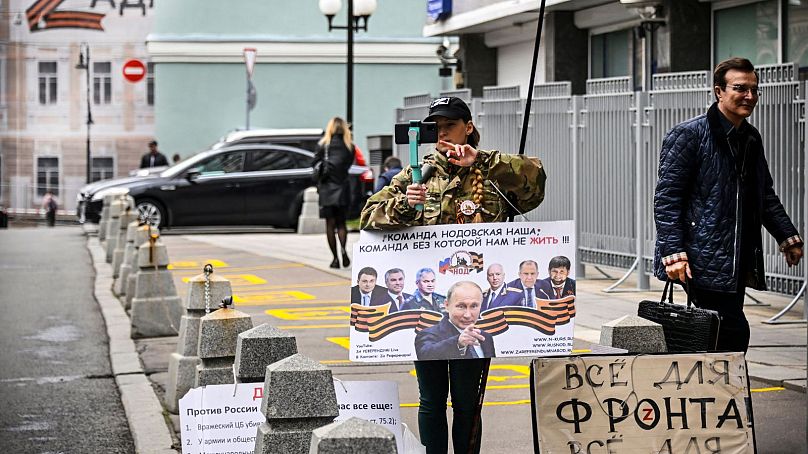
But what’s next for Russia will depend on the result of this partial mobilisation, Dr Miron added.
“While this document [Wednesday’s decree] does not leave out the possibility to escalate mobilisation, it remains to be seen how many will be mobilised and if these numbers are enough to reach the ‘goals of the military operation’,” she said.
“A full mobilisation would entail a declaration of war. While not quite impossible, right now it would seem that this is the most appropriate option in order not to cause too much public unrest while bolstering the military capabilities on the front.
“In addition, if Luhansk and Donetsk and potentially others join the Russian Federation, there will be a need for permanent presence to ensure that these territories can be defended. And the experience in Izium has shown that Russia did not have enough manpower. So, in essence, it is a way to avoid further territorial losses as well.”
Dr Luke March, Professor in Soviet and Post-Soviet Politics and Director of Undergraduate Teaching for Politics and International Relations at the University of Edinburgh, agrees that Putin will stir away from calling the conflict in Ukraine a war.
“Ultimately Putin doesn’t have to do anything and can try to pretend [the conflict] is something other than it is – this will be preferable to admitting openly that it is a war requiring full mobilisation, which runs the strong risk of people feeling deceived and inciting opposition,” Dr March said.
“If Western support doesn’t falter over a hard winter, and arms supplies continue, the balance of forces will increasingly favour Ukraine, and the domestic problems for Putin will start to grow much larger,” Dr March added.
un soldado ruso asiste a un ejercicio militar en el campo de entrenamiento de Golovenki en la región de Moscú, Rusia – Crédito de los derechos de autor: AP
COMPARTE ESTE ARTÍCULO
Facebook
gorjeo
flipboard
icono de correo
El presidente ruso, Vladimir Putin, declaró una “movilización militar parcial”, que podría hacer que 300.000 reservistas iniciales se unan a la guerra de Moscú en Ucrania.
Pero, ¿cómo funcionará la convocatoria de tropas frescas? ¿Cuál ha sido la reacción en Rusia? ¿Y qué pasa después si la movilización falla?
¿Qué sabemos de la convocatoria de tropas?
Putin se refirió a una movilización parcial de reservistas en su discurso, pero hay pocos detalles sobre números en el decreto del gobierno.
El ministro de Defensa de Rusia, Sergei Shoigu, dijo más tarde que se podrían movilizar hasta 300.000 personas de un grupo de 25 millones.
Los críticos señalan que el decreto se ha dejado deliberadamente vago para dar a las autoridades un amplio grado de libertad a la hora de implementarlo.
La convocatoria inmediata de 300.000 reservistas se referirá a aquellos que hayan servido previamente en el ejército ruso y tengan experiencia de combate o habilidades militares especializadas. No se incluirán estudiantes o reclutas, hombres jóvenes que cumplen mandatos obligatorios de 12 meses en las fuerzas armadas.
Los reservistas no pueden desplegarse físicamente en Ucrania de inmediato, ya que primero deberán someterse a una actualización o un nuevo entrenamiento y familiarizarse con la forma en que Rusia ejecuta lo que llama su “operación militar especial”.
CONTENIDO PATROCINADO
Web3 M&A alcanza la mayoría de edad con la ayuda de los mejores de la industria
Las fusiones y adquisiciones (M&A) no siempre reciben el cariño que merecen, pero deberían. En toda la economía, las fusiones y adquisiciones brindan un gran valor a todos cuando se hacen bien. Para estratégicamente inteligente…
Por Adquirir.Fi
Los analistas militares occidentales pronostican que pasarán varios meses antes de que vean acción.
Sputnik, foto de la piscina del Kremlin vía AP, archivo
Putin y Shoigu describieron algunos criterios para la movilización parcial, pero quedan dudas sobre quién será reclutado. Sputnik, Kremlin Pool Photo vía AP, archivo
Los reservistas serán incentivados financieramente y se les pagará como soldados profesionales de tiempo completo que ganan mucho más dinero que el salario promedio ruso. Eso puede hacer que la propuesta sea más atractiva para algunos hombres en las provincias donde los salarios son tradicionalmente más bajos que en las grandes ciudades.
Los contratos de los soldados profesionales conocidos como ‘kontraktniki’ que actualmente prestan servicio en las fuerzas armadas se prorrogarán automáticamente hasta que las autoridades decidan finalizar el período de movilización temporal. En otras palabras, se volvió mucho más difícil para los soldados profesionales en servicio renunciar.
Un día antes, el parlamento ruso aprobó un proyecto de ley para endurecer las penas por delitos como la deserción, el daño a la propiedad militar y la insubordinación si se cometen durante la movilización militar o situaciones de combate. Según una copia de la legislación, vista por Reuters, la entrega voluntaria se convertiría en un delito para el personal militar ruso punible con 10 años de prisión.
¿Qué nos dice la jugada de Putin sobre el conflicto en Ucrania?
El anuncio de Putin se produjo solo un día después de que se anunciara que los “referéndums” para unirse a Rusia comenzarán el viernes en las áreas ocupadas por Rusia de Luhansk, Donetsk, Kherson y Zaporizhzhya.
“La idea aquí es que si estos territorios se unen a la Federación Rusa, cualquier ataque contra ellos se consideraría como un ataque a Rusia”, dijo a Euronews la Dra. Marina Miron, del Departamento de Estudios de Defensa del King’s College de Londres.
“Entonces, es lógico comenzar esta movilización parcial ahora, especialmente a la luz de lo que sucedió en el óblast de Kharkiv y que sirvió como catalizador para este rápido giro en los acontecimientos”, agregó el Dr. Miron, refiriéndose a la contraofensiva de Kyiv en el noreste de Kharkiv. del país, donde ha recuperado 8.000 kilómetros cuadrados de territorio.
“Se sugiere que el número se calculó cuidadosamente y que solo se está movilizando la cantidad necesaria para proteger esos territorios”, dijo el Dr. Miron.
La movilización parcial también tiene como objetivo poner la campaña en Ucrania en el centro de la atención del público ruso y hacer que la gente se preocupe por la causa rusa, afirmó.
“El Kremlin ha estado tratando de cultivar el espíritu nacional durante muchos años y siguiendo esta lógica, esta movilización se percibe como una forma de reclutar a más personas para defender la patria”, dijo el Dr. Miron.
“No se trata de la guerra en Ucrania; se trata de defender a Rusia y los territorios que pertenecen a Rusia, por muy descabellado que parezca.
“La guerra en Ucrania no es una guerra entre Rusia y Ucrania, sino una guerra entre Rusia y ‘el Occidente colectivo’, a los ojos del Kremlin.
“Entonces, esta narrativa se usa para justificar tal movilización en primer lugar”.
Nikolay Petrov, investigador sénior del programa Rusia y Eurasia en la Chatham House de Londres, está de acuerdo.
“El discurso de Putin fue un intento de convertir la guerra imperialista en una guerra patriótica” después de casi siete meses de lucha, dijo.
el t
insinúa que los próximos “referéndums” tienen el mismo objetivo, compensar una campaña vacilante en Ucrania.
“Los inesperados referendos apresurados en los territorios ocupados de Ucrania son un intento del Kremlin de capturar estos territorios políticamente, ya que no pudo hacerlo militarmente”, dijo Petrov.
Por otro lado, Petrov también cree que la movilización parcial podría haber sido convocada para apaciguar las preocupaciones de los aliados políticos.
“Las reuniones recientes de Putin con los líderes de China, India y otros países no occidentales, que expresaron públicamente su descontento con la guerra prolongada y pidieron su fin, también pueden haber influido”, dijo Petrov.
Foto AP
Un voluntario de la comisión electoral regional de Luhansk distribuye periódicos a los ciudadanos locales antes de un referéndum en Luhansk. AP Photo
¿Qué tan preparados están los reservistas de Rusia?
En un discurso televisado a la nación el miércoles, Putin dijo que la “movilización parcial” involucra que “solo los ciudadanos que están actualmente en la reserva estarán sujetos a reclutamiento y, sobre todo, aquellos que sirvieron en las fuerzas armadas tienen una cierta especialidad militar y experiencia relevante”.
Según Shoigu, solo se movilizarán aquellos con experiencia relevante en combate y servicio. Los reservistas que responden a esta descripción son unos 25 millones de personas, pero solo se movilizará alrededor del 1%, afirmó Shoigu.
“La pregunta es: ¿se tienen que cumplir todos estos criterios o es suficiente cumplir con uno solo?”. preguntó el Dr. Miron. “Nuevamente, a pesar de los criterios aparentemente claros, esto ha causado mucha preocupación entre los posibles candidatos. Cabe señalar que Rusia tiene su propio “síndrome de Vietnam” después de la aventura soviética en Afganistán, por lo que pase lo que pase, el Kremlin tendrá que diseñar hábilmente su campaña informativa para evitar una posible reacción violenta a mayor escala”.
Olga Maltseva/AFP
Una valla publicitaria que promociona el servicio militar por contrato con la imagen de un militar y el lema “Servir a Rusia es un trabajo real” se encuentra en San Petersburgo el 20 de septiembre de 2022.Olga Maltseva/AFP
También puede haber problemas con la preparación de los reservistas.
Según el grupo de expertos con sede en Washington, el Instituto para el Estudio de la Guerra (ISW), “la reserva rusa tiene más de dos millones de ex reclutas y militares contratados en el papel, pero pocos están activamente entrenados o preparados para la guerra”.
ISW escribe que, históricamente, “solo el 10 por ciento de los reservistas reciben capacitación de actualización después de completar su período inicial de servicio”, y agrega que Rusia carece de la capacidad administrativa y financiera para capacitar a los reservistas de manera continua.
¿Cuál ha sido la reacción en Rusia?
El anuncio ha desencadenado protestas en Rusia, donde algunos están cada vez más fatigados por lo que en el país todavía se conoce como la “operación militar especial” en Ucrania.
Los medios rusos informaron un aumento en la demanda de boletos de avión poco después del discurso televisado de Putin el miércoles.
El mismo día, el líder opositor y disidente encarcelado Alexei Navalny acusó a Putin de enviar a más rusos a la muerte.
“Está claro que la guerra criminal está empeorando, profundizándose, y Putin está tratando de involucrar a la mayor cantidad de personas posible en esto”, dijo Navalny en un mensaje de video desde la cárcel grabado y publicado por sus abogados. “Quiere manchar a cientos de miles de personas con esta sangre”, dijo Navalny.
El miércoles, el movimiento de oposición de la Juventud Democrática “Vesna” convocó protestas en todo el país.
“Miles de hombres rusos, nuestros padres, hermanos y esposos, serán arrojados a la picadora de carne de la guerra. ¿Por qué estarán muriendo? ¿Por qué llorarán las madres y los niños? dijo el grupo.
Avtozak, un grupo ruso que monitorea las protestas, informó manifestaciones de decenas de personas en ciudades, incluidas Ulan-Ude y Tomsk en Siberia, y Khabarovsk en el Lejano Oriente, con algunos manifestantes arrestados por las autoridades.
Foto AP/Alexander Zemlianichenko
La policía antidisturbios detiene a un manifestante durante una protesta contra la movilización, en Moscú, Rusia, el miércoles 21 de septiembre de 2022. AP Photo/Alexander Zemlianichenko
“Los sentimientos hacia esta decisión han sido mixtos y ha habido bastantes instancias de oposición de varios medios de comunicación, como el sitio de noticias con sede en San Petersburgo Bumaga, que afirmó en su canal de Telegram que la frecuencia del término de búsqueda ‘ cómo romperse el brazo’ se había disparado entre los usuarios de Google de Rusia”, dijo el Dr. Miron.
“Dadas las protestas que tuvieron lugar en toda Rusia, es de suponer que la población no está a favor de esta nueva medida. Sin embargo, los medios oficiales están tratando de restarle importancia a esta nueva decisión, por lo que se intentará pacificar al segmento de la población que está en contra de esta movilización parcial”, agregó. “Será necesario actuar en el frente de la información para evitar una polarización completa de la población rusa. La situación es bastante complicada ya que una cosa es apoyar la ‘operación militar especial’ de Rusia en Ucrania, pero otra muy distinta cuando
existe la posibilidad de ser reclutado para contribuir activamente”.
No está claro si el tamaño de las protestas crecerá en los próximos días, especialmente si se tiene en cuenta que el Kremlin todavía castiga con dureza a quienes critican a los militares y la guerra de Rusia en Ucrania.
“El Kremlin ha endurecido drásticamente la legislación en el espíritu de la época de Stalin, lo que significará severas sanciones para cualquiera que evada la movilización, se niegue a participar en la guerra y la deserción”, dijo Petrov.
“La naturaleza represiva del régimen inevitablemente aumenta. En conjunto, cambiar radicalmente el juego y aumentar las apuestas parece una manifestación de la debilidad de Putin en lugar de la fuerza”.
El Dr. Miron también dijo que habrá una mayor presión sobre los reservistas para que respondan al llamado a las armas.
“Se ejercerá mucha presión sobre quienes se niegan a movilizarse o no pueden acreditar su incapacidad para servir por cualquier razón”, dijo.
“Es asumir que aquellos que no son lo suficientemente ‘patriotas’ intentarán presentar su caso en lugar de evitar una respuesta o rechazar el servicio rotundamente. En muchos casos, las personas tendrán que elegir el mal menor, cualquiera que sea en su situación particular. Dada la situación económica actual, existe la posibilidad de que las personas de las regiones más pobres de la Federación Rusa aprovechen esta oportunidad para ganar algo de dinero”, dijo.
Si esto no funciona, ¿qué sigue?
Orysia Lutsevych, jefa e investigadora del Foro de Ucrania de Chatham House, cree que la movilización parcial no será suficiente para cambiar el rumbo de la guerra y dar la ventaja a las tropas rusas.
“La movilización parcial no tendrá un impacto decisivo en el campo de batalla porque los nuevos reclutas no están entrenados y no están listos para el combate”, dijo, y agregó que no ve ninguna de las iniciativas impulsadas por el Kremlin con posibilidades de éxito.
“La infraestructura militar interna rusa difícilmente puede soportar la movilización general, ya que fue degradada por las recientes ‘reformas’. Ni Ucrania ni Occidente reconocerán los ‘referéndums’ ilegales. No cambiará la campaña militar en la que Ucrania se reserva el derecho de atacar y eventualmente liberar el territorio. Es probable que veamos más sanciones en respuesta a este movimiento”, dijo Lutsevych.
“Es bastante improbable que esta movilización no funcione”, dijo la Dra. Miron, señalando que 300.000 reservistas son “aproximadamente el número que las fuerzas terrestres rusas tienen en servicio activo”. Agregó que si bien no todos podrían apoyar la campaña en Ucrania, muchos podrían estar interesados en las ganancias financieras involucradas en la movilización.
AFP
Un activista realiza un piquete de una sola persona en apoyo del presidente ruso Vladimir Putin en el centro de Moscú el 22 de septiembre de 2022. AFP
Pero lo que sigue para Rusia dependerá del resultado de esta movilización parcial, agregó el Dr. Miron.
“Si bien este documento [el decreto del miércoles] no deja de lado la posibilidad de escalar la movilización, queda por ver cuántos se movilizarán y si estos números son suficientes para alcanzar los ‘objetivos de la operación militar’”, dijo.
“Una movilización total implicaría una declaración de guerra. Si bien no es del todo imposible, en este momento parecería que esta es la opción más apropiada para no causar demasiado malestar público mientras se refuerzan las capacidades militares en el frente.
“Además, si Luhansk y Donetsk y potencialmente otros se unen a la Federación Rusa, será necesaria una presencia permanente para garantizar que estos territorios puedan ser defendidos. Y la experiencia en Izium ha demostrado que Rusia no tenía suficiente mano de obra. Entonces, en esencia, también es una forma de evitar más pérdidas territoriales”.
El Dr. Luke March, profesor de política soviética y postsoviética y director de enseñanza de pregrado en política y relaciones internacionales en la Universidad de Edimburgo, está de acuerdo en que Putin dejará de llamar guerra al conflicto en Ucrania.
“En última instancia, Putin no tiene que hacer nada y puede tratar de fingir que [el conflicto] es algo diferente de lo que es; esto será preferible a admitir abiertamente que es una guerra que requiere una movilización total, lo que corre el riesgo de que la gente se sienta engañados e incitando a la oposición”, dijo el Dr. March.
“Si el apoyo occidental no flaquea durante un invierno duro y el suministro de armas continúa, el equilibrio de fuerzas favorecerá cada vez más a Ucrania y los problemas internos de Putin comenzarán a crecer mucho más”, agregó el Dr. March.
www.euronews.com/2022/09/22/putins-reservists-call-up-how-will-it-work-and-what-does-it-mean-for-russias-war-in-ukrain
